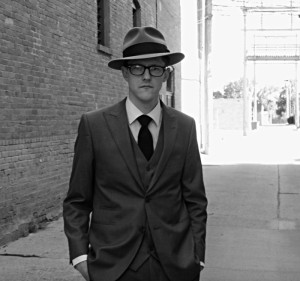Today I’m pleased to post an interview with Travis Gulbrandson, author of The Believers. If you missed my review of The Believers you can read it here.
 Tell us a little about your background and how you started writing.
Tell us a little about your background and how you started writing.
I’m from a small town in South Dakota, and began writing when I was in high school after one of my teachers recruited me for the newspaper. I’ve been writing for papers ever since then, pretty much. It was only within the past five years or so that I began writing fiction. I always assumed it was outside of my abilities, but decided to give it a go. It was hard — and it continues to be — but I kept at it, and I’m glad I did.
Which authors most influence your writing? What is your favorite novel?
In terms of The Believers, I would say Flannery O’Connor, Jerzy Kosinski, Cormac McCarthy, William Faulkner and Yukio Mishima were the biggest influences. They are big influences on my writing in general, though, too, along with Frank Norris, Dorothy Parker, Arthur Rimbaud, Jean Genet, John Steinbeck, Graham Greene and many others.
As for my favorite novel, that would be McTeague, by Frank Norris. It’s a naturalist book that I believe was published in 1899. I acquired it from a “free box” in a used bookstore as a teenager, but I didn’t read it until I was in college. It has a lot of problematic areas, the style is overly descriptive at times (it is naturalism, after all) and it may be a tad too long, but I love it anyway.
Many authors are inspired by real events. What inspired you to write The Believers?
Although certain elements are taken from things I heard about or experienced, the vast majority of it consists of things that came to me as I was working on the story. The main impetus for writing the book was just to see whether I could do it. I had been writing short fiction for more than a year by the time I started writing The Believers, and I thought it would be a good exercise to see if I could sustain something longer than 10-20 pages.
When I was trying to think of what I could write about, I remembered a story I completed about three months previous. That story later became the epilogue of the book.
(Incidentally, I began writing that story when I was attending an award ceremony with some friends. Katie Couric was in town to receive the Al Neuharth Award for Excellence in Media. During the presentation, I had an idea that I just started writing down on a notepad I brought with me. Once I had written about one and a half pages, I put the pad away and watched her receive the award.)
When you started the novel did you have a clear idea about where the story was going or did it develop as you wrote it?
I didn’t know quite what the story was going to be for the first month or two of writing. I just thought it was going to be some dark picaresque kind of thing. I knew I wanted the main character to interact with an older woman, but I didn’t know what their relationship would be. Then I saw a story about paranormal researcher James Randi coming out of the closet at the age of 82. I have always liked his work and hold him in high esteem, and the more I thought about it, the more it seemed like the key to the book. After that, the story came together fairly quickly, although it took me about 20 months to get it just the way I wanted.
The title along with the story give me the impression that you are trying to convey something to the reader about belief or faith. What do you want readers to take away from this novel?
I’m happy with whatever interpretation they want to give it. I’m of the opinion that once a book it published, it should belong to the readers, and that it can have a different meaning for each of them. Once the author steps in and says, “No, this is what I meant,” any other interpretations are pretty well killed off. I had intentions, and I think I fulfilled them, but I don’t feel comfortable trying to spell them out, even if that means people misinterpret what I was trying to say.
What are you working on now?
I’m in the final stages of my second novel, which is called Away from the Nets. It was triggered in part by a quote from Jean Genet (“There is nothing so dangerous as repression.”) and a viewing of the film Viridiana by Luis Buñuel. I hope to publish it online in August.
I’m also at work on a collection of short stories and one brief essay, to be released in 2015.
On top of that, I’m doing research for an historical novel, for which there is no completion date. I’ve been researching it for more than two years, and I have no idea how much more will be required before I’m finished. I do hope to start writing it next year, though.
Tell us where we can find more information about you online.
My official page is www.travisgulbrandson.com. I also have author pages on Goodreads and Librarything. The best place to find out what I’m up to is www.facebook.com/tgulbrandson. I update that page 5-6 times each week.
I’m grateful to Travis Gulbrandson for taking time out of schedule to answer a few questions for us. You can buy his novel, The Believers, online here.